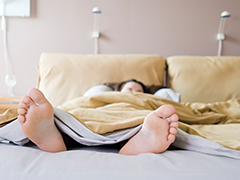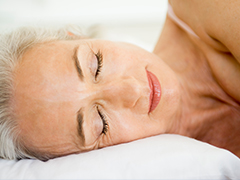Back to BlueNews

10 Simple Tips for Better Sleep

Diet and exercise may be key components of overall health, but have you considered paying attention to your sleep hygiene? Aside from boosting your energy for the next day, getting enough rest at night can help curb your appetite, regulate hormones and improve brain function.
Here are 10 ways to optimize your day to help you get better sleep at night:
- Get enough bright light during the day. Your circadian rhythm depends on the sun to tell your body when to wake and when to sleep. If sunlight is scarce, try using a lamp designed to emit daylight wavelengths.
- Taper off device usage before bedtime. Blue lights from digital devices can not only cause eye strain, but tricks your brain into thinking it's daytime.
- Quit caffeine after 3-4pm. Caffeine stays in your blood for 6-8 hours, which means a late afternoon coffee break can end up keeping you up at night.
- Put off power naps. It depends on the individual, but sleeping in the daytime can actually disturb your circadian rhythm.
- Keep it consistent. Your internal clock is more regular than you probably realize. If you struggle to sleep, try to get in the habit of waking up and going to bed at the same time every night—weekends included.
- Try a supplement. Melatonin is a naturally-occurring hormone that signals your brain when it’s time to sleep. Start with 1-5 mg a half hour to an hour before bedtime.
- Say no to nightcaps. Studies have shown that alcohol disrupts normal melatonin production, making it difficult to maintain normal sleep patterns.
- And midnight snacks. You might feel like a nap after dinner, but eating a large meal before bed actually leads to poor sleep and hormone disruption. However, a high-carb meal a few hours before bed may help improve sleep.
- Make a to-do list. Stressing about what’s due tomorrow can prevent you from getting a good night’s sleep. Try keeping a notebook on your nightstand to list important tasks for the next day. Some studies have shown that putting your worries on paper helps unload stress before bed and helps you sleep better.
- Don’t exercise just before bed. Regular exercise is good for your health, but for some people the spike in adrenaline can lead to increased alertness at night.


